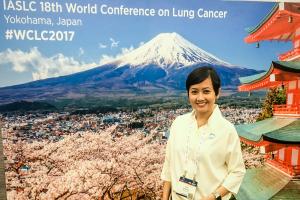 I was diagnosed with advanced lung cancer at the age of 29.
I was diagnosed with advanced lung cancer at the age of 29.
Prior to the diagnosis, I led an active lifestyle and participated in several fun runs. With a regular dose of the sun and fresh air from the beach resort where I was working five days a week, and with no immediate family history at that time, cancer was not within my radar. I thought I was completely healthy.
Given the gravity of the news and the rollercoaster of emotions that we went through upon my diagnosis, I chose to privately deal with my illness only within my close circle of family and friends. I did not want people to hear about my cancer because of the fear of pity, being overshadowed by the stigma associated with lung cancer, and the burden I took upon myself of having to uplift the down emotions of those who learned of my actual diagnosis. However, in rare instances that I did let people in and allowed them to know, I preferred to tell them face-to-face and hear it directly from me.
Sympathy was not what I needed. What I needed was to feel as normal as possible and for those around me to act the same way.
It is natural for a cancer patient to be emotionally beaten down by the overwhelming amount of information that comes with the countless medical appointments, consultations, and non-stop research. While I am fortunate to have an extremely strong support system within my circle of family and friends, even the best treatment facilities and healthcare team can only do and support so much in managing this disease.
Unfortunately, in the Philippines, where I live, there is not much online nor offline community support and survivorship programs particularly for lung cancer, which continues to be the leading cause of cancer deaths in the country and worldwide.
But with the help of technology, I unexpectedly discovered a different kind of support and genuine empathy from fellow survivors through online lung cancer communities. Regardless of the type, stage, and treatment experiences, the psychological impact on the people diagnosed with cancer is very much similar, yet it is particularly unique to “ground zero,” the survivors.
When I discovered LUNGevity Foundation online, I found a wealth of useful resources and solid community support, not only from experts in the field of thoracic oncology but also from fellow survivors and caregivers sharing their experiences in managing the disease. Much more than an online portal, I found LUNGevity to be a close-knit virtual community of individuals who can relate with me as I, with them.
After the 5th anniversary of my diagnosis of lung cancer and countless treatments and therapies later, I attended the LUNGevity National HOPE Summit in Washington D.C., almost 9,000 miles from my home, last April 2017. As I personally did not know anyone living with lung cancer (except my father who received his diagnosis a year after mine), it was pleasantly overwhelming to meet and be surrounded by over 200 lung cancer survivors of different ages, stages and circumstances. There were so many different stories of struggles and triumphs, but what was most striking to me was that the summit was full of life and hope!
Soon after joining the National HOPE Summit, I decided to become an advocate for lung cancer in whichever way I can proactively be of help – raise awareness, give support, contribute to research and science, and to humanize the leading cause of cancer deaths worldwide. I signed up to be a Social Media Ambassador as I knew I needed to contribute to changing how lung cancer is currently perceived – and it does not necessarily have to be surrounded by stigma and hopelessness.
One small step in advocating for lung cancer survivorship opened another door. In October 2017, I participated in a patient-nurse advisory board as a prelude to the 18th World Conference on Lung Cancer in Yokohama, Japan. Joined by a select group of survivors and oncology nurses within Asia-Pacific, we discussed and shared experiences and the unmet needs with a pharmaceutical company to improve the treatment and health care experience of those living and caring for people with lung cancer. As the youngest and diagnosed the longest survivor within the group who has tried the greatest number of treatments and therapies, and the only participant from the Philippines, it was a privilege to give a voice to patients and make a concrete contribution to improve the outlook on lung cancer survivorship.
While we continue to seek treatments to manage the disease and look forward to the day that advancements in science put an end to lung cancer, we will continue moving forward and use this adversity to positively impact the lives of others. I write today in the hope that my experience as someone affected with lung cancer will somehow find its purpose and meaning.
I am now 35 years old and discovering that just like a lobster, it is only in discomfort and getting rid of my secure shell can I further grow and find more purpose. It might have taken me several years to find the courage but I am finally coming out of my shell with the goal of making a positive impact in the world affected by this disease.
